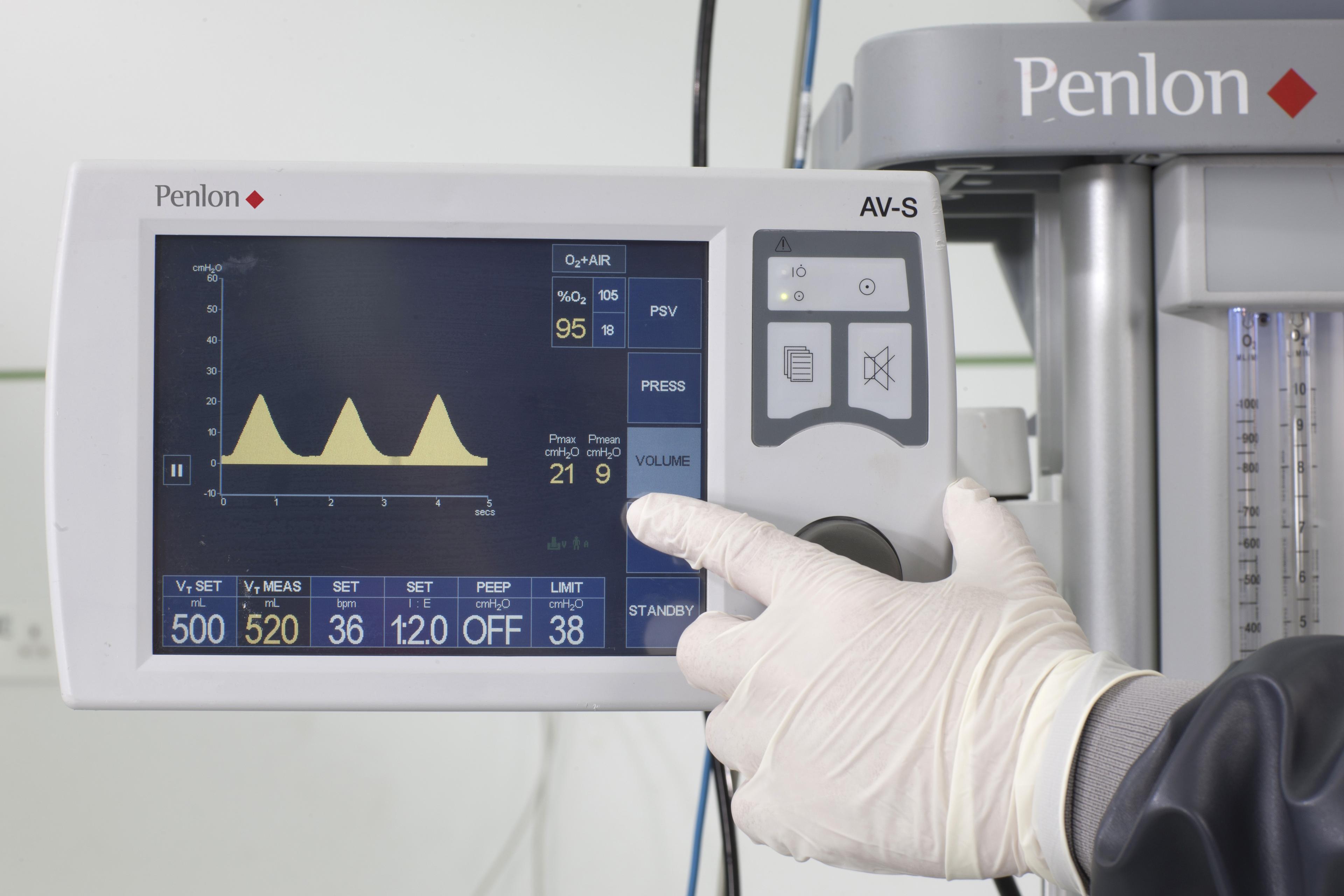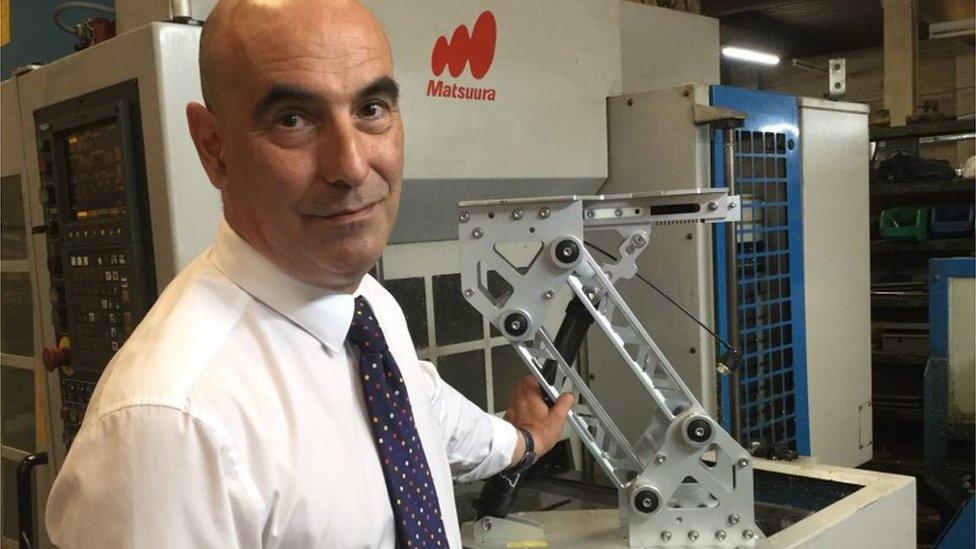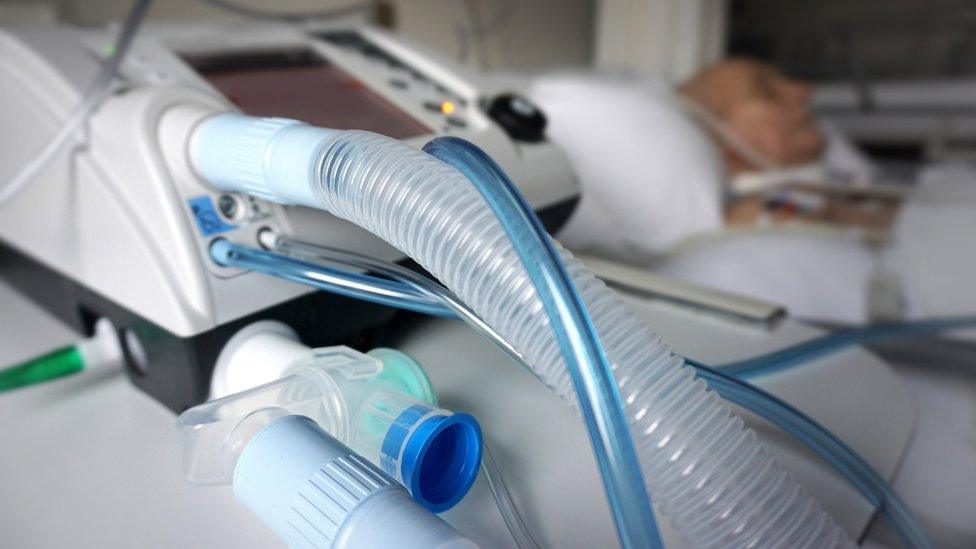Coronavirus: Plan to ramp up ventilator production 'unrealistic'
- Published

A medical devices maker has cast doubt on using non-specialist manufacturers to produce more ventilators.
Craig Thompson, head of products at Oxfordshire company Penlon, said the idea that other firms could switch production was unrealistic.
Prime Minister Boris Johnson has urged engineering firms, including carmakers, to explore if they could make the life-saving equipment.
Ventilators are critical in the care of some people suffering coronavirus.
But there is concern the National Health Service will face a shortage of equipment as the virus infects more people.
The manufacturers association, Make UK, says that it would be possible for some specialist engineers to scale up production under licence.
Ford, Honda, car parts firm Unipart, digger maker JCB, and aero-engine maker Rolls Royce are among companies looking into the feasibility of switching some production.
Medical ventilators are used to provide oxygen to patients with breathing difficulties, but there are not nearly enough of them to deal with the coronavirus outbreak.
Allow X content?
This article contains content provided by X. We ask for your permission before anything is loaded, as they may be using cookies and other technologies. You may want to read X’s cookie policy, external and privacy policy, external before accepting. To view this content choose ‘accept and continue’.
The Department of Health has revealed that in a worst case scenario the NHS will need an additional 20,000 of the machines. The NHS currently has about 5,000 adult ventilators and 900 for children in critical care facilities.
The Health Secretary, Matt Hancock, has tweeted asking for help from "all manufacturers who can support our National Effort for coronavirus ventilator production".
But Penlon, which makes anaesthesia machines that include a ventilator, is cautious about hopes that other companies can start making the equipment.
"The idea that an engineering company can quickly manufacturer medical devices, and comply with the rules, is unrealistic because of the heavy burden of standards and regulations that need to be complied with," said Penlon's Mr Thompson.
He said "the focus should be on existing medical device companies increasing supply of ventilators".
His firm makes 750 machines a year and could double production, given time. In the short term he could provide the NHS with up to 200 more machines.
"The manufacture of medical devices, such as ventilators, is highly regulated," Mr Thompson adds. "Typically a new medical device takes two or three years to develop and launch."

EASY STEPS: How to keep safe
A SIMPLE GUIDE: What are the symptoms?
GETTING READY: What is the UK's 'delay' phase?
TRAVEL PLANS: What are your rights?
IN-DEPTH: Coronavirus pandemic
LATEST UPDATES: Follow live

The UK's only specialist maker of ventilators for intensive care units, Breas, in Stratford-upon-Avon, has already increased capacity and moved to seven-day working.
Breas makes a range of ventilators called Nippy, which are widely used in the NHS, but it only has 150 staff worldwide.
Make UK believes that the solution to the ventilator problem is to use what it calls contract manufacturing.
"Rather than a particular company trying in their own factory to make thousands and thousands of ventilators - which they would struggle to do - you have around them other manufacturers with capacity," said Stephen Phipson, Make's chief executive.

What is a ventilator?
A ventilator is a machine that helps a person breathe by getting oxygen into the lungs and removing carbon dioxide
Ventilators can be used to help a person breathe if they have lung disease or another condition that makes breathing difficult. They can also be used during and post-surgery
A tube, connected to a ventilator machine, is placed in a person's mouth, nose or through a small cut in the throat (called a tracheostomy)

The ventilator makers would licence their designs to other contractors. "There are quite a few companies in the UK which do that sort of work every day of the week," Mr Phipson added.
Small manufacturers are already responding to the government's appeal for help.
Jules Morgan, who owns KPM Marine, in Birmingham, making equipment for the marine industry, has offered to see whether he could make ventilator components.

Jules Morgan says some components would have to be sourced from China
"The key will be in how it's managed. It'll involve different manufacturers making different parts - and somewhere it can go to be assembled," he says. "It's a big ask, but I think it's doable."
He said challenges would include sourcing electrical components from China and testing the units, which is a time consuming process.
But he said expectations may have to change. "These are extraordinary times, so you have to be pragmatic and innovative. We need to speak to medical professionals to find out what the core requirements are, and work to those.
"We may need to consider using older technology that's easier to produce in high volumes," Mr Morgan said.
- Published16 March 2020
